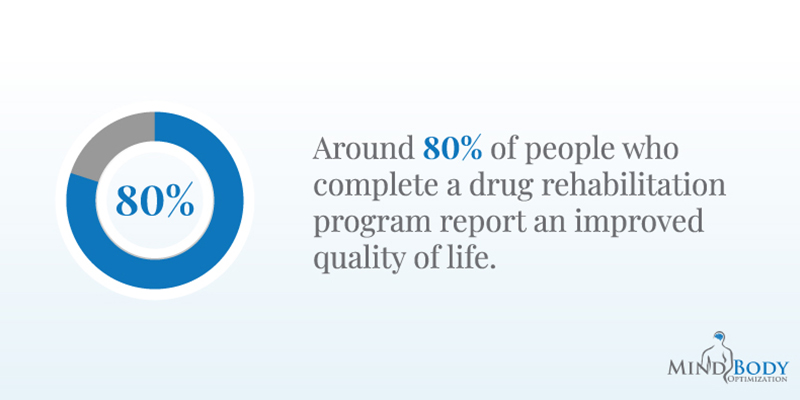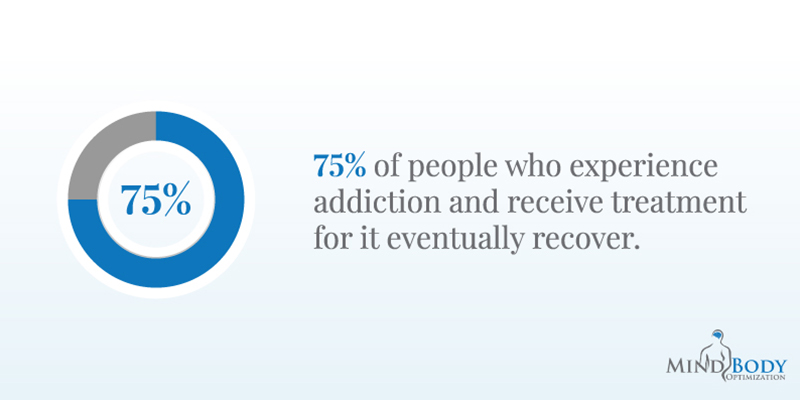Recovery Programs for Substance Abuse
Our Approach to Mental Health
When it comes to mental health and wellness, Mind Body Optimization (MBO) stands out as a beacon of whole-person care and support.
With a steadfast dedication to healing the mind, body, and spirit, MBO has carved a niche for itself in the field of substance use disorder (SUD) recovery.

Understanding Substance Abuse and Recovery
SUD and addiction are complex disorders that can have devastating effects on individuals and their loved ones. Substance use disorders refer to the harmful or hazardous use of psychoactive substances, including alcohol and illicit drugs, which can lead to addiction.1
Commonly Misused Substances
- Barbiturates
- Benzodiazepines
- Stimulants (such as methamphetamine and cocaine)
- “Club drugs” (such as MDMA and ketamine)
- Hallucinogens (such as LSD and PCP)
- Opioids (such as heroin, morphine, fentanyl, and oxycodone)
- Alcohol
The Importance of Comprehensive Treatment in Recovery Programs for Substance Abuse
- Detoxification
- Rehabilitation
- Ongoing support
- Aftercare plans
The Complex Relationship Between Trauma, Mental Health, and SUD
A crucial aspect of understanding substance use disorder is recognizing that it is often intertwined with trauma and mental health challenges.
Many people turn to substances as a way to cope with trauma or reduce symptoms of mental health disorders, such as:3
- Depression
- Anxiety
- Post-traumatic stress disorder (PTSD)
- Bipolar disorder
- Codependency
- Behavior addictions (gambling, sex, eating disorders)
"Substance abuse recovery programs, like ours at MBO, recognize the interconnected nature of substance use and mental health disorders. Professionals conduct thorough assessments to identify co-occurring conditions and integrate strategies that address both issues simultaneously. This integrated approach ensures comprehensive care for individuals experiencing dual diagnosis, meaning that all symptoms will be fully addressed and cared for."
MBO Healthcare Staff Tweet
What Are Symptoms of SUD?
- Cravings: Intense desire or urge to use the substance, often leading to compulsive drug-seeking behavior.
- Loss of Control: Difficulty controlling the amount or frequency of substance use, despite repeated attempts to cut down or stop.
- Physical Dependence: Development of tolerance to the substance, requiring larger amounts to achieve the desired effect, and experiencing withdrawal symptoms when not using the substance.
- Withdrawal Symptoms: Physical or psychological symptoms that occur when the substance is discontinued or reduced, such as nausea, tremors, depression, insomnia, or flu-like symptoms.
- Neglecting Responsibilities: Prioritizing substance use over important obligations or responsibilities at work, school, or home.
- Social and Interpersonal Problems: Experiencing difficulties in relationships with family, friends, or coworkers due to substance use, such as conflicts or withdrawal from social activities.
- Continued Use Despite Consequences: Persisting in substance use despite experiencing negative consequences, such as health problems, financial difficulties, or deterioration in relationships.
- Risk-Taking Behavior: Engaging in risky or dangerous behaviors while under the influence of substances, such as driving under the influence, unprotected sex, or involvement in criminal activities.
- Loss of Interest: Loss of interest or pleasure in activities that were once enjoyable or important.
- Physical Health Problems: Experiencing physical health issues related to substance use, such as liver disease, respiratory problems, cardiovascular complications, or overdose.
What to Know About Substance Use Disorder Symptoms
Recovery Programs for Substance Abuse: A General Overview
Comprehensive Treatment Modalities
At MBO, the approach to recovery programs for substance abuse is deeply rooted in an in-depth understanding of each person. MBO recognizes that addiction is not just a physical ailment. It is a complex interplay of biological, psychological, and social factors.
MBO’s integrative approach to substance abuse recovery programs encompasses a wide range of therapies and modalities designed to address the whole person.
This includes evidence-based treatments such as:
- Cognitive-behavioral therapy (CBT)
- Motivational interviewing (MI)
- Dialectical behavior therapy (DBT)
- Trauma-based therapies
- Rational emotive behavior therapy (REBT)
- Family systems approach to treatment
We also incorporate holistic therapies like yoga, mindfulness, and meditation into treatment.
"Mind Body Optimization tailors recovery programs for substance abuse by employing a comprehensive and individualized approach. Therapeutic modalities, such as cognitive-behavioral therapy (CBT), motivational interviewing, and mindfulness-based techniques, are integrated to address the multifaceted aspects of addiction and support lasting recovery. This way, we can focus on both the mental and physical aspect of how substance use affects our clients’, ensuring full-body healing."
MBO Healthcare Staff Tweet

Our Integrated Approach to Recovery Programs for Substance Abuse
MBO takes a comprehensive and integrated approach to substance abuse recovery, recognizing that each person’s journey to sobriety is unique.
We value your story, seen through your lens, and in your own words.
At the core of MBO’s approach is the belief that true healing involves addressing the underlying causes of addiction, not just the symptoms.
Our Team of Experts
At MBO, recovery programs for substance abuse are led by a multidisciplinary team of experts who specialize in trauma-informed care and addiction treatment.
This team includes:
- Psychiatrists
- Psychologists
- Licensed therapists
- Counselors
These experts are trained in evidence-based practices for treating SUD.
Many of our Texas-based team have undergone their own recovery challenges. We know what it takes to reach sustainable recovery and we are committed to utilizing our experience to create a lasting change in our community — one individual at a time.
Addressing Underlying Trauma and Co-Occurring Mental Health Disorders
MBO recognizes that many people struggling with substance abuse have experienced trauma or suffer from conditions such as anxiety, depression, or PTSD.
In fact, approximately 75% of individuals with a substance use disorder have experienced trauma at some point in their lives.
MBO’s treatment approach takes into account the impact of trauma on a person’s life and integrates this understanding into the treatment process. This allows us to provide specialized care that addresses both the symptoms of substance abuse and the underlying issues that contribute to it.
What is Trauma?: A Closer Look
Components of Recovery Programs for Substance Abuse at MBO
Our compassionate MBO team offers comprehensive recovery programs for substance abuse that integrate evidence-based therapies, complementary wellness modalities, and trauma-informed care principles.
These programs are designed to address the complex needs of those struggling with SUD and co-occurring mental health disorders.
Evidence-Based Therapies
A Closer Look at MI
Complementary Treatment Modalities
In addition to evidence-based therapies, MBO also incorporates whole-person treatment modalities into our recovery programs for substance abuse.
These may include:
- Mindfulness practices
- Meditation
- Experiential therapies
These modalities can help people develop coping skills, reduce stress, and improve their well-being.6
"Substance abuse recovery programs integrate education and skill-building components to empower individuals with practical tools for relapse prevention. Educational sessions provide insights into triggers and warning signs, while skill-building activities equip individuals with coping strategies, stress management techniques, and problem-solving skills crucial for sustaining recovery. Our team at Mind Body Optimization works with you to curate specific relapse prevention strategies for comprehensive, full-body treatment."
MBO Healthcare Staff Tweet
Trauma-Informed Care Principles
The Process of Detox in Recovery Programs for Substance Abuse
Evaluation
Medical Monitoring
Withdrawal Management
Nutritional Support
Proper nutrition and hydration are essential during detox to support the body’s healing process and replenish nutrients that may have been depleted due to substance use. Medical staff may provide nutritional guidance and monitor hydration levels to ensure optimal health and well-being.
Psychosocial Support
Gradual Tapering
What to Know About MBO’s Programs

Tailored Treatment Plans in Recovery Programs for Substance Abuse
Creating Individualized Treatment Plans
There is No One-Size-Fits-All in Healing
Incorporating Patient Preferences, Goals, and Strengths
Providing Continued Support Throughout Recovery
Supporting Clients Beyond Recovery Programs for Substance Abuse
Prioritizing Long-Term Wellness and Relapse Prevention Strategies
- Ongoing therapy
- Support groups
- Lifestyle changes
Helping With the Transition into Community-Based Support Networks
- Local support groups
- Community resources
- Other services that can provide ongoing support and encouragement
Promoting Mental and Physical Health

Overcoming Barriers to Accessing Recovery Programs for Substance Abuse
Common Barriers to Accessing Substance Abuse Treatment
- Financial constraints: Many people may not be able to afford the cost of treatment, especially if they don’t have insurance coverage for substance abuse services.
- Lack of transportation: Some people may have difficulty accessing treatment facilities due to lack of transportation or distance from treatment centers.
- Stigma: The stigma surrounding substance abuse can prevent people from seeking help, as they may fear judgment or discrimination.
- Limited availability of services: In some areas, there may be a lack of available services or long waiting lists for treatment programs.
Accessibility, Affordability, and Inclusivity in Recovery Programs for Substance Abuse at MBO
- Accessibility: MBO strives to make its programs accessible to all people by offering flexible outpatient scheduling and telehealth options.
- Affordability: MBO works with clients to explore all available options for financing treatment, including insurance coverage, sliding-scale fees, and payment plans.
- Inclusivity: MBO is committed to creating a welcoming and inclusive environment for all clients, regardless of their background, gender identity, or sexual orientation.

Pave a Path Worth Following
The significance of comprehensive approaches in substance abuse recovery cannot be overstated. MBO is dedicated to providing comprehensive, personalized, and compassionate care that addresses the physical, emotional, and spiritual aspects of addiction.
Our innovative and compassionate approach recognizes that true healing involves more than just treating the symptoms of addiction: it addresses the underlying issues that contribute to substance abuse and promotes wellness.
Lead the Life You Deserve
We encourage those struggling with SUD to seek support and healing. Whether you’re just beginning your journey to recovery or are looking for ongoing support, MBO is here to help.
Our team of knowledgeable and empathetic experts is committed to providing you with the care and resources you need to achieve lasting sobriety and wellness.
As we move forward, MBO remains steadfast in our commitment to continue providing compassionate and effective substance abuse recovery programs. We are constantly evolving and adapting our programs to meet the changing needs of our clients and the community.
Contact Mind Body Optimization Today
Together, we can overcome the challenges of SUD and find sustainable healing. Reach out to us today for more information about our recovery programs for substance abuse.
Together, we can pave a path worth following. One where we can all find sustainable change.
Resources
- https://www.nimh.nih.gov/health/topics/substance-use-and-mental-health
- https://www.mayoclinic.org/diseases-conditions/drug-addiction/symptoms-causes/syc-20365112
- https://istss.org/clinicians-corner-psychotherapy-interventions-for-co-occurring-ptsd-and-substance-use-disorders/
- https://www.ncbi.nlm.nih.gov/pmc/articles/PMC2897895/
- https://www.ncbi.nlm.nih.gov/pmc/articles/PMC2797106/
- https://www.ncbi.nlm.nih.gov/pmc/articles/PMC7230658/
